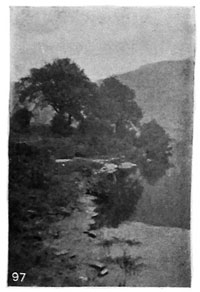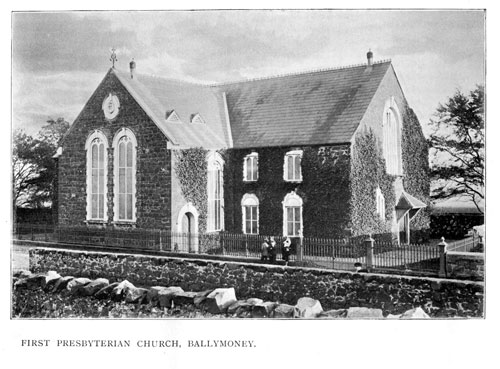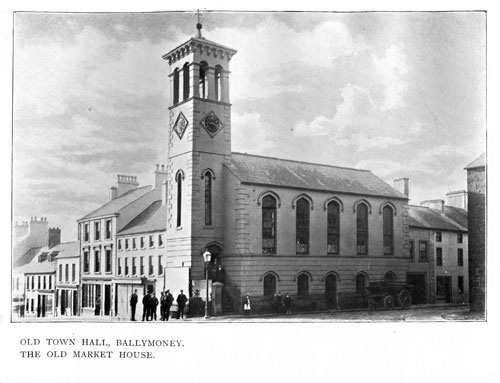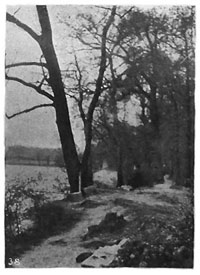Chapter II.
FIVE PRESBYTERIAN MINISTERS OF BALLYMONEY.
 THE Rev. Patrick Adair, Minister of Belfast, in his "True Narrative of the Rise and Progress of the Presbyterian Church in Ireland," writes as follows: "It is to be much observed, that the Sovereign Holy Lord in His providence, by this rebellion, made way for a more full planting of the gospel, even in those parts which had met with the greatest cruelty." Most of the regiments of the Scottish army which had come over at this time were accompanied by chaplains "who were ordained ministers of their national church," and they set themselves to appoint sessions or elderships in each of the regiments. On the 10th June, 1642, five of these chaplains, viz.: Revs. Cunningham, Baird, Peebles, Scott and Aird, and four ruling elders from the regimental sessions constituted the first regular Presbytery formed in Ireland at Carrickfergus.
THE Rev. Patrick Adair, Minister of Belfast, in his "True Narrative of the Rise and Progress of the Presbyterian Church in Ireland," writes as follows: "It is to be much observed, that the Sovereign Holy Lord in His providence, by this rebellion, made way for a more full planting of the gospel, even in those parts which had met with the greatest cruelty." Most of the regiments of the Scottish army which had come over at this time were accompanied by chaplains "who were ordained ministers of their national church," and they set themselves to appoint sessions or elderships in each of the regiments. On the 10th June, 1642, five of these chaplains, viz.: Revs. Cunningham, Baird, Peebles, Scott and Aird, and four ruling elders from the regimental sessions constituted the first regular Presbytery formed in Ireland at Carrickfergus.
As soon as this, which is sometimes called the "Army Presbytery," had been formed, a great many districts in Down and Antrim applied to them to have ministers settled among them and religious ordinances established. The new Presbytery were not able to supply all the demands, and in response to urgent appeals made to the General Assembly of the Church of Scotland, several ministers were appointed to come over and assist in the work.
In the Route district, the three congregations of Dervock (then called Derrikeighan), Ballymoney and Billy, were the first to have ministers ordained over them. The Rev. John Baird, who had been chaplain of the Duke of Argyle's regiment, was settled in Dervock, and the Rev. James Ker in Ballymoney, and the Rev. Jeremiah O'Quin in Billy, in the year 1646. "The Presbytery" writes Rev. Patrick Adair, "were somewhat troubled in settling Mr. James Ker at Ballymoney, and Mr. Jeremiah O'Quin at Billy. In these two parishes of Route, where they were called by the plurality of the people, but opposed by some disaffected persons, particularly by Mr Stewart of Ballintoy, who had some interest in Ballymoney. They had given in divers things in a libel against these two expectants anent the unsoundness of somewhat they had delivered in their doctrine." The Presbytery, however, upon fair trial, "found nothing to obstruct the settling of these men." But they were destined never to be out of trouble with regard to these two ministers; who are described as "men of great reputation for honesty and zeal, though of little learning and no great judgment."
In 1649, after the execution of Charles I., the Presbytery required all its ministers to read from the pulpit what was called a "Representation," condemning amongst many other things the execution of the King. This, these two brethren refused to do, having evidently republican tendencies, and in spite of all arguments "they persisted in their opinion and refused to concur," "and the brethren having waited long on them at last passed upon them a sentence of suspension." But Adair remarks, "they despised the sentence and justified themselves to the people they conversed with."
In the year 1653, these two inseparable companions appear again on the scene, and "Mr. James Ker desired to be readmitted to his former society with his brethren, and gave great testimonies of his ingenuously loathing his former course," "and so Mr. Ker was received into the fellowship of his brethren upon his declared repentance," and Mr. O'Quin as usual followed his example.
There is no doubt that Mr. Ker officiated in the Parish Church of Ballymoney during the greater part of his ministry, and enjoyed a share of the tithes.
Mr. Ker is reported, in 1656, in a list of ministers who received an allowance from the Cromwellian Government, his grant being £120 a year. There is also an entry regarding his friend, Mr. O'Quin as follows: "Paid Mr. O'Quin in consideration of his paines in preaching the gospel and towards defraying his charges to Dublin, £40. Cromwell's Government also contributed £25 towards his funeral expenses" (Benn's History of Belfast). Rev. Dr. Field, of Dervock, states that Mr. O'Quin is buried in Billy churchyard, the date of his death being there given as 1657. He was delivered from the troubles through which his friend Mr. Ker was afterwards called to pass. Shortly after the restoration of Charles II., sixty-one Presbyterian ministers were ejected from their churches for non-conformity, and the Rev. James Ker, of Ballymoney, is given in the list as one of these. He was also ordered to be brought up before the House of Lords to answer for his conduct during the time of the Commonwealth, already referred to. Mr. Ker evaded this order by escaping with his wife to Scotland, where he died shortly after. In the troubled times that followed, Ballymoney was probably for many years without a minister. The congregation seems now to have been supplied for a short time by a licentiate named David Houston, evidently a man of very independent mind, and little inclined to submit to ecclesiastical authority. During his stay in Ballymoney he became acquainted with the famous Alexander Peden, and evidently was much influenced by his views, for in 1686 "he was invited by the followers of Renwick and Peden to join their Society and exercise his ministry among them." He thus came to be one of the first representatives of what is now the Reformed Presbyterian Church in Ireland.
The next of whom there is a definite record is the Rev. Hugh Kirkpatrick, who seems first of all to have been Minister of Lurgan, but the Lurgan people had not been able to induce him to return from Scotland, whither he had evidently fled. This reluctance to do so was probably due to the disturbed state of the country at that critical period.
In 1692, the case of Ballymoney "with reference to advice" for a minister is referred to the Synod, and David Boyd and R Love appear as Commissioners to ask for advice.
In 1694, there is the following entry in the minutes of the Synod with regard to Ballymoney. "Appears from thence, Allen Dunlop with others complaining that though Mr. Hugh Kirkpatrick was, by sentence of last Synod, transported to them, they have not yet enjoyed any of his labours, he being still in Scotland. His letter to the Synod was read wherein he desires the Synod to loose his relations from Ballymoney. The people of Ballymoney are appointed to have all ready for receiving Mr. Kirkpatrick." This was in the happier days which followed the establishment of William III. on the throne.
In 1697, Mr. Kirkpatrick appears at the Synod, having evidently been persuaded in the meantime to come to his congregation.
In 1699, Mr. Kirkpatrick was chosen Moderator of the Synod of Ulster, and in the following year preached at the opening of the Synod from the text, "Take heed therefore unto yourselves, and to all the flock over the which the Holy Ghost hath made you overseers" (Acts xx., 28). Mr. Kirkpatrick was the father of the celebrated Dr. James Kirkpatrick, author of "Presbyterian Loyalty," and appears to have been a man of eminent literary attainments. He died April 1st, 1712.
Ballymoney was vacant till 1716, but during these years an attempt was made to form it into a a Collegiate Charge, that is, a congregation supporting two ministers. In 1715, there appeared before the Synod the following representatives:-- Cornet Alex. McGown, James Henry, Alan Templeton, R Dinsmore, John Love, Peter Gamble, Thos. Reid, Quintin Dick, John Lamond, appealing against a decision of the Synod of Derry taking twenty quarterlands from the congregation of Ballymoney and annexing fourteen of them to Killrachts.
Several of the aforesaid quarterlands prayed not to be taken away from Ballymoney on the ground that the roads they have to Killrachts Meeting House "are oft scarce to be travelled."
The result of the matter was that Ballymoney was given the choice of either having two ministers and paying each of them £35 and 15 bolls of oats, or of giving up the fourteen quarterlands to Killrachts. The following quaint advice was also given to the Ballymoney people, that "considering the expensiveness of the place, that the people of Ballymoney provide convenient farms for both their ministers, to be paid at the ministers' expense."
The congregation of Ballymoney evidently decided to give up the quarterlands in dispute and be content with one minister, for on September 26th, 1716, Rev. R McBride was ordained Minister in Ballymoney, and on September 27th, Rev. John Cochrane was ordained Minister of Killrachts.
It is probable that during the ministry of Mr. Kirkpatrick, a church was built on the opposite side of the Fair Hill from the present site. The session house was, as usual in those times, built separate from the church, and both were buildings of a very primitive kind, and, judging from the accounts in Mr. McBride's time must have needed constant repair.
During the years 1730-1759, a glimpse at the inner working of the congregation can be had. "The Session which meets regularly has a due sense of the importance of its work and conducts its affairs in a very dignified manner." Such entries as the following occur: "The Sacrament of the Lord's Supper was administered in this congregation on the 26th day of May. The Fast was kept and the Elders visited their quarters and the tokens were distributed according to appointment." "At a Session June ye 12th, 1733, after prayer sederunt John Lusk, Benjamin Boyle, etc. The Sacrament of ye Lord's Supper was administered May 27th. The Fast was kept on ye Wednesday preceding; tokens distributed judicially; the Elders visited their quarters and made a very comfortable return. After ye charge of ye Elements, distributed to ye poor £04. 02s. 00d."
Some curious and almost forgotten customs come to light. The church seems to have provided for the use of the people, Palls for covering the coffins at funerals and black cloaks for the chief mourners. The rules for the use of these are given in the Session Book.
Ist. |
"That ye price of the fine Velvet Paul be three crowns to any who use it out of this Congregation and two crowns to ye inhabitants of the Parish." |
2ly. |
"That the price of the black shag cloth be now to the inhabitants of this Parish 02s. 08½d., to any who use it out of the Parish four shillings." |
3ly. |
"That ye price for each Cloak is, ye parishioners one shilling -- " |
The remainder of the leaf is wanting, and the knowledge of what those outside the Parish were to pay is lost to posterity. A person was appointed to take charge of the Pauls and Cloaks, named John Steele, who made regular returns of the money received to the Session.
It is interesting to note that in the Burial Register of the first and second congregations of Belfast, mention is made of similar palls and mourning cloaks, the letting out of which sometimes produced £50 a year. The palls, which in that Register are called Mar (mort) cloths and were of great repute, were sent often at considerable cost to great distances (Benn's History of Belfast).
The accounts of the congregation of Ballymoney were very carefully kept by Mr. Adam Caldwell, and were always audited by two others of the Session. There are many curious entries. On every Sacrament Sabbath, Mr. McBride received 8s. 1½d., and the clerk of the Session a like sum. On one occasion the precentor received 11s. 4½d. Constant repairs, such as thatching and glazing the house and repairing the pulpit, are mentioned. The Tent is continually referred to, and was probably used at Communion Seasons. The following interesting entry occurs:-- "N.B. -- As the Act of Parliament for the Reform of our Calendar takes place the 3rd day of this month (Sept.), you are to notice that the 3rd day according to the old stile is to be dated the 14th according to the new stile."
Mr. McBride was Moderator of Synod in 1728. He died in 1759, and an entry with regard to that sad event was made in the Session Book as follows:-- " The Rev. R McBride departed this life on Sabbath, the 2nd September, about seven of the clock in the afternoon, in the year of our Lord 1759, aged 73 years. He was an eminent Divine, charitable to the poor, affable and free in his conversation, and respected by all who had the happiness to be acquainted with him." Mr. McBride was the son of the well-known Rev. John McBride, minister of the first Presbyterian congregation in Belfast, whose will may be seen in Benn's History of Belfast (p. 405). "I leave to my son David, now abroad, a guinea, to be paid to him at his return; also I leave a guinea to my son Alexander, together with any Physick Books I have; also I leave a guinea to my son-in-law. Hugh Dyat, and his wife, Margaret McBride. I leave no more to these mentioned in regard I have already given them what portions I could allow them."
For refusing to swear that the Pretender was not the son of King James II., which he alleged he could not conscientiously do, the Rev. John McBride had to escape arrest by fleeing to Scotland. In his portrait which is in Belfast, a hole may be seen made through his bands by the sword of the disappointed official who came to arrest him. Rev. John McBride was the author of several important controversial works.
Mr. Park states that in the Parish Church of Ballymoney in Mr. McBride's day a marble slab was erected bearing the following testimony to the excellence of his character:--
"Near this place Lies the Body of the Reverend R McBride, minister of the Presbyterian congregation in this Parish Forty-three years. Truly pious, always cheerful, moderate in his principles, He faithfully discharged the duties of his Function. Was universally beloved and lived in friendship with the good men of all persuasions. He died on the 2nd day of September, 1759, in the seventy-third year of his age."
His younger son entered the British Navy, and became a Rear-Admiral, "in which capacity he had the honour of conveying to England her late Majesty Queen Charlotte, of spotless memory."
"The Rev. R Smylie," continues Mr. Park, "from the neighbourhood of Letterkenny, was chosen to succeed Mr. McBride by the Ballymoney congregation. He was remarkable not so much for brightness of talent as for mildness and gentleness of disposition and temper. His period of usefulness was but short, as his delicate constitution yielded to the fatigue, anxiety and difficulties of his situation, after a ministry of eight years."
It may be added that before Mr. Smylie was called, the Ballymoney congregation had petitioned the Synod for the removal of Rev. Mr. Rankin from Antrim to Ballymoney, but their request was refused. Only two elders -- namely, Messrs. Jas. Moor and Thos. Boyd -- are recorded as having attended the Synod during Mr. Smylie's ministry. In the old burying-ground, in the corner near the church tower, a headstone was erected to the memory of Mr. Smylie. The following is the inscription thereon:--
"Sacred to the memory of the Rev. R Smylie, eight years minister of the Dissenting Congregation of Ballymoney. He practised the divine truths which he recommended to his hearers. He died on the 31st of August, 1767, in the 35th year of his age. This stone is erected by order of his affectionate spouse, March, 1812.
"This is erected here as Mr. MacBride, Mr. Smylie, and Mr. Marshall occupy the same grave.
"Reader, forget not to live as thou wouldst have lived when thou comest to die, and use thy neighbour as thou wouldst have him use thee."

"Rather more than four years," writes Mr. Park, "elapsed from the death of Mr. Smylie until the congregation agreed in the choice of a successor. After hearing upon trial many licentiates they selected the Rev. Alexander Marshall from the district of Faughan Vale. Mr. Marshall was an excellent classical scholar, of quick natural talents, and of very commanding powers as a public speaker. In the higher judicatories of the church he took a most active part." Mr. Marshall was ordained on the 18th August, 1772. Almost the first work he had to undertake was the rebuilding of the church. This was done, not on the same site, but at a little distance from it.
On the inside of the front entrance porch is a stone with the following inscription:--
"The foundation of virtue is truth, and the foundation of happiness virtue. Who shall ascend into the hill of the Lord, and who shall stand in His holy place? He that hath clean hands and a pure heart. The true worshippers shall worship the Father in spirit and in truth."
* * * * * * * * * *
"This House was built in the year 1777, to which the Right Hon. the Earl of Antrim generously contributed."
In 1795, Mr. Marshall, who in the meantime had received the degree of Doctor of Divinity, was chosen Moderator of the Synod of Ulster. At the opening of the Synod in 1796, Dr. Marshall preached from the text, "Watch ye, stand fast in the faith, quit you like men, be strong" (I. Cor. xvi., 13).
In the last years of his life. Dr. Marshall's health and spirits were much affected by the troubles of the rebellion of 1798. Many of his best friends were under suspicion of being concerned in the rising. Indeed, two ministers of the Presbytery, Rev. J. Glendy and Rev. J. Smith, were accused of treasonable practices. The one was allowed to emigrate and the other was imprisoned. Many members of his own congregation were undoubtedly disaffected, and actually either took part in the Battle of Antrim or were on their way to it. Tradition says that even Dr. Marshall himself was supposed to have leanings to the side of the rebels. Many executions took place at the Market House. A great part of Ballymoney was burned, in which conflagration most of the church records were destroyed in the house of one of the members. Even to this day in some houses in the district may be seen relics of the Rebellion, in the shape of knives made out of swords used at that crisis. Many families of the congregation found it necessary at this time to emigrate to America, and striking tales are still told of their wonderful escapes. Sunk down by all these troubles. Dr. Marshall died 10th April, 1799.

In the graveyard there is a stone flag raised to his memory. "In grateful remembrance of the Rev. Doctor Alexander Marshall, Presbyterian minister of Ballymoney for twenty-seven years. His mourning parishioners and some others have erected this stone to his memory. He was truly pious, liberal in his principles, lived beloved, and died lamented by good men of every persuasion. He departed this life the 10th of April, 1799, aged 50 years."


